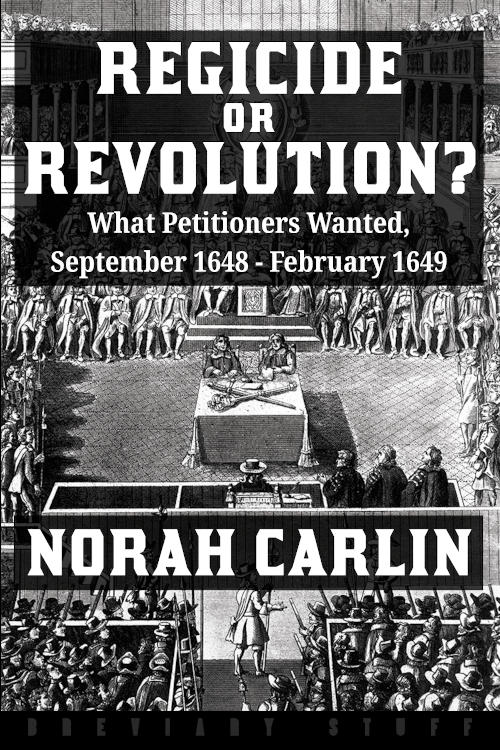- Abbreviations
- Acknowledgements
- Introduction
- PART ONE: PETITIONS TO PARLIAMENT, September - November 1648
- 1. London Levellers’ Large Petition
2. Oxfordshire
3. Leicestershire
4. Newcastle-Upon-Tyne
5. Yorkshire
6. Fleetwood’s Regiment
7. Four Northern Counties
8. Wiltshire
9. Berkshire - PART TWO: GENESIS OF THE ARMY REMONSTRANCE, September - November 1648
- 10. Northern Army Letters to Fairfax
11. Ireton’s Regiment
12. Ingoldsby’s Regiment
13. Fleetwood’s Regiment
14. ‘Several Regiments’
15. Fleetwood’s, Whalley’s and Barkstead’s Regiments
16. Rainborowe’s Regiment
17. Overton’s Regiment
18. The Remonstrance of the Army - PART THREE: ARMY PETITIONS FROM THE REMONSTRANCE TO PRIDE’S PURGE, November - December 1648
- 19. Harrison’s Regiment
20. Cromwell’s Regiment
21. Pride’s and Deane’s Regiments
22. Pride’s Regiment
23. North-East Garrisons
24. Hewson’s Regiment
25. Horton’s Regiment and South Wales Garrisons
26. Northumberland Horse Regiment
27. Sir Hardress Waller’s Brigade
28. Regiments of Scroop And Saunders
29. Walton’s Regiment
30. Sussex Garrisons
31. Nottingham Castle Garrison - PART FOUR: ARMY PETITIONS FROM PRIDE’S PURGE TO THE KING’S TRIAL, December 1648 - January 1649
- 32. General Council of Officers
33. Lambert’s Brigade
34. Regiment of John Reynolds
35. Dover Castle Garrison
36. Boston Garrison
37. Garrisons Of Shrewsbury and Ludlow
38. Lancashire Officers
39. Four Ships In The Downs
40. Livesay’s Regiment
41. Denbigh Castle Garrison and Local Supporters
42. Oxfordshire County Troop
43. Portsmouth, Isle of Wight and Hurst Castle Garrisons
44. Garrison of Hull
45. Regiments Besieging Pontefract - PART FIVE: LOCAL PETITIONS TO THE ARMY, FROM THE REMONSTRANCE TO THE KING’S TRIAL,November 1648 - January 1649
- 46. Rutland
47. Berkshire
48. Surrey
49. ‘County Of Ware’
50. Bristol
51. Kent
52. Glamorgan
53. Newport Pagnell
54. Hertfordshire
55. Worcestershire - PART SIX: PETITIONS TO PARLIAMENT, FROM PRIDE’S PURGE TO THE KING’S EXECUTION, December 1648 - February 1649
- 56. Somerset
57. Kent
58. Garrison of Hull
59. Norfolk
60. Herefordshire
61. Common Council of The City Of London
62. South Coast and Malmesbury
63. Nottinghamshire
64. Surrey
65. Kent
66. Buckinghamshire
- Index
Norah Carlin – Regicide or Revolution?
What Petitioners Wanted, September 1648-February 1649
£18.50
The dozens of petitions addressed to Parliament and the army in the five months before Charles I’s execution are widely recognised as having influenced the events that led to his trial and death. A few phrases or short passages from the texts have frequently been quoted by historians, and some have argued that they represent no more than a propaganda campaign engineered by a small number of political and military leaders. There has never before been a comprehensive examination of these texts, over sixty in number, and only the whole body of them in all its diversity can offer a real prospect of assessing their contribution. They are presented here with as much information as could be gathered about the background and context of each. The evidence suggests that although sometimes prompted from above, all but a few of the texts were produced by groups of activists in meetings and discussion, and gained the support of larger numbers in subscriptions. The petitions were responding to events as they occurred, and we must avoid the temptation to see them as causing the events that followed – especially the king’s execution, which has been a focus for hindsight almost since it happened. None of them call openly for the king’s death, and even among those that call for vengeance for the blood spilt in the civil wars, only a few name him directly. Many express concern for the common people’s rights and liberties, and a substantial minority call for a radical redefinition of the English constitution, with the House of Commons at its centre as representative of the people. Some list reforms in the law and society that reveal a wider vision of revolution for England, and very many expand on their own interpretation of the civil wars and more recent events.'Popular petitions were at the very heart of the revolutionary crisis of 1648-1649 and this book is unique in recovering their meaning, the context in which they were issued, and the people who wrote and supported them. Essential reading.'
John Rees, author of The Leveller Revolution
John Rees, author of The Leveller Revolution
'The petitions Norah Carlin has transcribed and carefully contextualized in Regicide or Revolution? represent an incredibly important cache of materials for understanding the crisis of the English Revolution, the trial and execution of Charles I. Carlin convincingly demonstrates that these petitions were not straightforward demands for bloody retribution. Rather, their content varied considerably, incorporating radical demands for legal, social and constitutional reform, giving historians a highly important window into the ideals and aspirations of the ‘well affected’ both within and outside the army. The collection should be required reading for scholars and students of the English Revolution, and the general reader alike.'
Ted Vallance, University of Roehampton, London
Ted Vallance, University of Roehampton, London
'At last the army petitions of 1648-9 have found their editor and historian. Every student of the English Revolution will be indebted to Norah Carlin for bringing together in one place the soldiers' petitions, from all over England and Wales, that demanded justice, however they conceived it, after the first and second civil wars. Each petition has been carefully edited, set in context, and assessed in what is an authoritative edition of very important documents in the history of relations between Parliament, army and people.'
Stephen K. Roberts, Director, History of Parliament Trust
Stephen K. Roberts, Director, History of Parliament Trust




